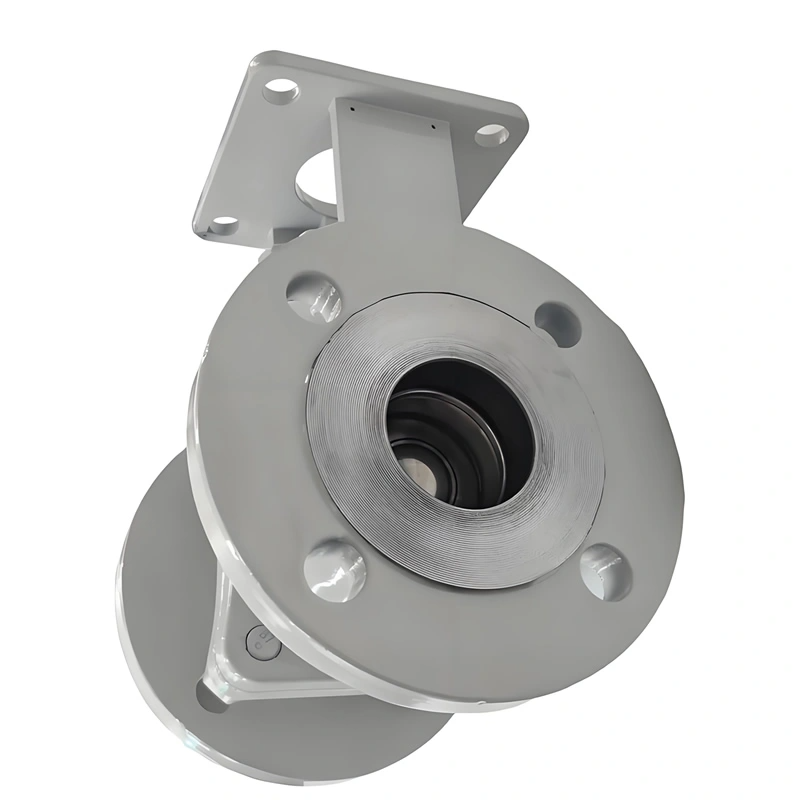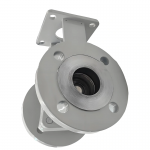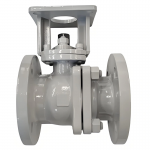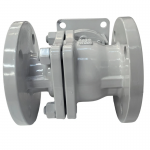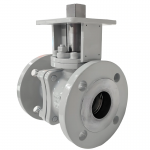Specification
2PC PN16 DN50 Full Bore Flanged WCB Cast Steel Floating Ball Valve with Manual/Pneumatic/Electric Operation for Water, Oil & Gas Industrial Systems
I. Product Overview
|
Product Name
|
2PC PN16 DN50 Full Bore Flanged WCB Floating Ball Valve
|
|
1. Material
|
WCB(Stainless Steel/Duplex steel/Aluminium Bronze/Nickel-aluminum Bronze/Titanium Alloy, etc. available)
|
|
2. Size
|
1/2~40 inch ( DN15~DN800)
|
|
3. Port
|
Full Port
|
|
4. Working Pressure
|
PN16-PN100 / CLASS 150-600
|
|
5. Connection Ends
|
RF
|
|
6. Working Temp.
|
-20ºC~200ºC
|
|
7. Suitable Medium
|
Non corrosive medium (water,oil,gas)
|
|
8. Operated
|
Manual, Worm Gear, Pneumatic actuator, Electric Actuator
|
|
10. Manual option
|
Locking Manual
|
|
11. Design standard
|
API6D/API608/API607,ASME B16.34,DIN,EN,JIS
|
|
12. Inspection & Testing
|
According to API598
|
|
13. Brand
|
TIANYU Valve
|
|
14.Certificates
|
ISO 9001, CE, TS, API6D,API607,AIP 6FA
|
|
15.MOQ
|
10 PCS/size(Special material depends on)
|
II. Core Specifications and Parameters
1. Size and Pressure Rating
- Nominal size: DN50 as a typical specification, covering DN15 to DN800 (1/2 inch to 40 inches), suitable for adapting to small-to-medium and large industrial pipelines;
- Nominal pressure: Designed with a pressure rating of PN16, ranging from PN16 to PN100 (equivalent to CLASS 150 to CLASS 600), compatible with low-to-medium and medium-to-high pressure industrial systems. PN16 is particularly suitable for pressure requirements in conventional industrial pipelines and municipal engineering;
- Connection type: Flanged connection (RF sealing face) is adopted, with flange dimensions and tolerances conforming to international standards, ensuring precise alignment with pipeline systems for easy and reliable installation.
2. Material Composition
- Valve body material: The main body is made of WCB cast steel (carbon steel), featuring high strength (tensile strength ≥485MPa), good toughness, and wear resistance, capable of withstanding long-term erosion by non-corrosive media. It also offers options such as stainless steel (e.g., 304, 316), duplex steel, aluminum bronze, nickel-aluminum bronze, and titanium alloy to meet corrosion resistance requirements of different working conditions;
- Valve seat material: Options include metal seals, PTFE (polytetrafluoroethylene), PTFE + carbon fiber, and PTFE + glass fiber, depending on media characteristics. PTFE series are suitable for normal-temperature, low-pressure scenarios, while metal seals are adapted to high-temperature, high-pressure environments;
- Ball material: A solid floating ball design is used, matching the valve body material (e.g., WCB cast steel ball). The surface undergoes precision grinding to ensure tight fit with the valve seat, enhancing sealing efficiency.
3. Structure and Operation
- Structure type: Two-piece split structure, with the valve body consisting of two parts connected by bolts, facilitating maintenance and replacement of internal components. The floating ball design allows the ball to automatically press against the valve seat under media pressure, achieving “pressure self-sealing.” The leakage rate in the closed state can reach Grade VI (zero leakage) as per GB/T 13927 standards;
- Flow path type: Full bore design, with the flow path diameter consistent with the pipeline inner diameter, minimizing media flow resistance (flow resistance coefficient ≤0.1) and reducing pressure loss, especially suitable for scenarios requiring large flow conveying;
- Operation mode: Supports multiple drive methods, including manual (with locking function), worm gear transmission, pneumatic actuators, and electric actuators. Manual operation is equipped with a lockable handle to prevent unauthorized misoperation; pneumatic/electric operation is suitable for systems requiring remote control or automatic adjustment;
- Safety design: Integrates fire-resistant structure (compliant with API 607/6FA standards), maintaining basic sealing performance even after accidental fires. It also includes a built-in anti-static device, which conducts electricity between the ball and valve body via a conductive spring to prevent safety hazards caused by static accumulation.
4. Standards and Certifications
- Design standards: Complies with international specifications such as API 6D, API 608, API 607, ASME B16.34, DIN, EN, and JIS, ensuring structural strength and performance stability;
- Testing standards: Factory inspection is conducted in accordance with API 598 standards, including shell pressure test (1.5 times nominal pressure), sealing test (1.1 times nominal pressure), and operational flexibility test;
- Certification qualifications: Certified by ISO 9001 quality management system, CE, TS, API 6D, API 607, and API 6FA, meeting access requirements of major global industrial markets.
Product Overview
III. Product Performance Features
1. Efficient Fluid Conveying Capacity
2. Reliable Sealing and Pressure-Bearing Performance
3. Flexible Operational Adaptability
4. Wide Working Condition Tolerance
IV. Precision Manufacturing Process
1. Material Selection and Pretreatment
2. Split Structure Processing
3. Full-Process Testing and Inspection
- Shell pressure test: Clean water (or kerosene) is filled into the valve body, applying 1.5 times the nominal pressure (24bar for PN16), holding for 30 minutes. No leakage or structural deformation is confirmed through pressure decay method (allowable pressure drop ≤0.5bar/h) and visual inspection;
- Sealing performance test: 1.1 times the nominal pressure (17.6bar) is applied to the inlet and outlet sides respectively, holding for 15 minutes. Zero leakage is ensured using the bubble method (≤1 bubble per minute);
- Operational performance test: Under no-pressure conditions, the valve is manually/electrically operated to complete 5 full open-close cycles, recording operating force and stroke time to ensure no jamming, no loosening, and accurate limiting (full open/close position deviation ≤1°).
4. Surface Treatment and Packaging
Valve Details
-

Material Precision Treatment and Forming
WCB cast steel undergoes two-stage treatment: spectral component screening, step normalization for stress relief, precision casting to reduce allowance, and ball precision grinding for high sealing accuracy.
-

Modular Machining and Intelligent Assembly
3D positioning for valve body machining, laser calibration for precision, diamond tools for sealing surfaces, intelligent assembly with traceable data recording.
-

Full Working Condition Testing and Limit Verification
4D testing system: dual-medium shell testing, helium mass spectrometry for leakage, high and low temperature tests, ensuring stable valve operation.
V. Core Product Advantages
1. Quality System Throughout the Lifecycle
2. Wide Media and Scenario Adaptability
3. Balanced Cost and Performance
4. Stable Supply Through Mass Production
Application
VI. Application Fields
1. Oil and Gas Industry
- Crude oil pipelines: Used as block isolation valves in oilfield gathering systems to control crude oil flow direction. The wear resistance of WCB cast steel withstands trace sediment in crude oil;
- Natural gas distribution stations: Applied in gas path switching at urban gate stations or sub-transmission stations. The full bore design reduces pressure loss, ensuring stable gas supply pressure;
- Refineries: Used in raw oil pipelines of atmospheric and vacuum distillation units, with pneumatic operation enabling remote opening/closing and fire-resistant design enhancing equipment safety.
2. Power Industry
- Thermal power plants: Serves as a circulation pump outlet valve in cooling water systems. The full bore flow path reduces head loss, saving pump energy consumption;
- Substations: Used in transformer cooling oil pipelines, with manual locking function preventing misoperation and ensuring stable equipment operation.
3. Water Treatment and Municipal Engineering
- Waterworks: Controls flow in clear water tank outlet pipelines. PTFE valve seats prevent water pollution, meeting hygiene standards;
- Sewage treatment plants: Applied in reclaimed water reuse pipelines. WCB cast steel resists slight corrosion from reclaimed water, extending service life;
- Urban gas pipelines: Functions as an inlet valve in community pressure regulating boxes. The anti-static design eliminates spark hazards, ensuring safe gas use for residents.
4. General Industrial Fields
- Machinery manufacturing: Used in lubricating oil pipelines of hydraulic stations. Manual operation facilitates quick oil circuit cutoff during equipment maintenance;
- Food processing plants: Applied in steam-assisted heating systems (≤200℃). Flanged connections allow regular cleaning and disinfection.
RELATED
-

High Temperature/Pressure 304 Stainless Steel Resistant Manual Power Forged Three Piece Flanged Floating Ball Valve
TIANYU 304 Stainless Steel Flanged Floating Ball Valve: Corrosion-Resistant Full-Port Flow Control Solution for Industrial, Sanitary, and Municipal Me…
BALL VALVE 11/03/2025 -

API ANSI 2in-16in DN50-DN400 PN10 PN16 CF8M Pneumatic Flanged Floating Ball Valve
TIANYU CF8M Pneumatic Flanged Floating Ball Valve: 2in-16in (DN50-DN400) PN10-PN16 API/ANSI Class Corrosion-Resistant Flow Control Solution for Indust…
BALL VALVE 11/01/2025 -

Large-Diameter DN1400 CLASS150 WCB SS Triple Eccentric Metal-Sealed Hard Seal Butterfly Valve
TIANYU DN1400 (56″) CLASS 150 WCB Hard Seal Butterfly Valve: Triple Eccentric Metal-Sealed Flanged Valve for Large-Diameter Industrial Media wit…
BUTTERFLY VALVE 10/30/2025 -

PN16 Stainless Steel Floating Ball Valve: Full Port 2PC Flange-Connected Valve with Fire-Safe & Anti-Static SS Ball Valve
TIANYU Stainless Steel Floating Ball Valve: Full Port 2PC Flange-Connected Valve with Fire-Safe & Anti-Static Design for Oil, Gas, and Industrial …
BALL VALVE 10/29/2025 -

High-Performance DN80 Class 150 WCB Soft-Sealed Lug-Type Double Eccentric Butterfly Valve
TIANYU 3” Class 150 WCB lug-type double eccentric butterfly valve is a technologically advanced flow control device engineered to address the challeng…
BUTTERFLY VALVE 10/25/2025 -

DN125 PN16 CF8M Stainless Steel Lug-Type Butterfly Valve with PTFE Lining Concentric Line Butterfly Valves
TIANYU DN125 PN16 CF8M stainless steel lug-type butterfly valve is a precision-engineered flow control device designed to address the challenges of ha…
BUTTERFLY VALVE 10/25/2025


